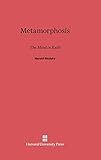Metamorphosis : The Mind in Exile / Harold Skulsky.
Material type: TextPublisher: Cambridge, MA : Harvard University Press, [2013]Copyright date: ©1981Edition: Reprint 2014Description: 1 online resource (244 p.)Content type:
TextPublisher: Cambridge, MA : Harvard University Press, [2013]Copyright date: ©1981Edition: Reprint 2014Description: 1 online resource (244 p.)Content type: - 9780674424975
- 9780674424982
- Creation (Literary, artistic, etc.)
- Creativiteit
- Création littéraire
- Création littéraire
- Deutsch
- Empiricism
- Englisch
- Enlightenment
- Imagination
- Literatur
- Philosophie
- Romanticism
- Romantiek
- Romantik
- Theorie
- Verbeelding
- Verbeeldingskracht
- Verlichting (cultuurgeschiedenis)
- LITERARY CRITICISM / General
- Metamorphosis in literature
- PHILOSOPHY / General
- HISTORY / General
- 128/.3
- B105.I49
- online - DeGruyter
| Item type | Current library | Call number | URL | Status | Notes | Barcode | |
|---|---|---|---|---|---|---|---|
 eBook
eBook
|
Biblioteca "Angelicum" Pont. Univ. S.Tommaso d'Aquino Nuvola online | online - DeGruyter (Browse shelf(Opens below)) | Online access | Not for loan (Accesso limitato) | Accesso per gli utenti autorizzati / Access for authorized users | (dgr)9780674424982 |
Frontmatter -- ACKNOWLEDGMENTS -- CONTENTS -- INTRODUCTION: The Problem and the Method -- CIRCE AND ODYSSEUS: Metamorphosis as Enchantment -- OVID'S EPIC Metamorphosis as Metaphysical Doubt -- THE GOLDEN ASS Metamorphosis as Satire and Mystery -- THE WEREWOLF OF MARIE de FRANCE: Metamorphosis Alienation and Grace -- THIEVES AND SUICIDES IN THE INFERNO Metamorphosis as the State of Sin -- SPENSER'S MALBECCO Metamorphosis Monomania and Abstraction -- DONNE'S "SULLEN WRIT' Metamorphosis as Satire and Metaphysics -- LAMIA AND THE SOPHIST Metamorphosis as the Inexplicable -- THE ORDEAL OF GREGOR SAMSA Metamorphosis as Alienation without Grace -- VIRGINIA WOOLFS ORLANDO Metamorphosis as the Quest for Freedom -- NOTES -- INDEX
restricted access online access with authorization star
http://purl.org/coar/access_right/c_16ec
Fusing the methods of comparative literature, intellectual history, and philosophical analysis, Harold Skulsky explores a motif that has fascinated storytellers since antiquity: the miraculous transformation of a character into a plant, an animal, or a different human being. The thesis of the study is that the fantasy of metamorphosis challenges the narrator and his audience to confront certain basic anxieties about the human condition: Is the mind reducible to physical properties? What constitutes personhood? How does physical form affect personal identity and continuity of the self? Testing instances in which these and related perplexities appear in literature, Skulsky systematically and provocatively interprets ten major illustrative texts drawn from diverse epochs and languages, including the works of Homer, Ovid, Apuleius, Marie de France, Dante, Donne, Spenser, Keats, Kafka, and Woolf. Through Skulsky's masterly analysis the victims of metamorphosis in narrative literature--whether werewolf, ass, beetle, swine, or tree--provide a profound insight into the complexities of human experience.
Mode of access: Internet via World Wide Web.
In English.
Description based on online resource; title from PDF title page (publisher's Web site, viewed 24. Aug 2021)


